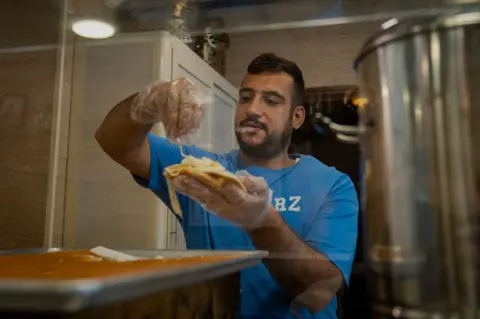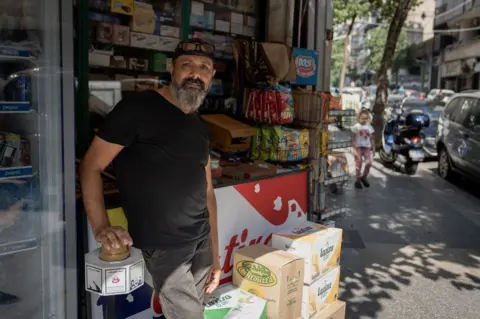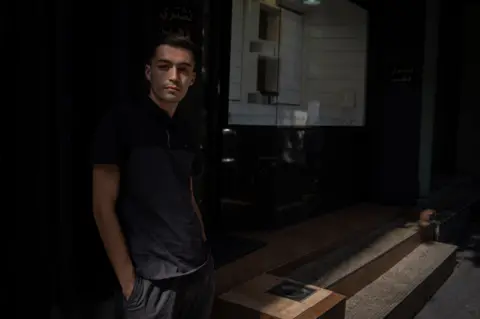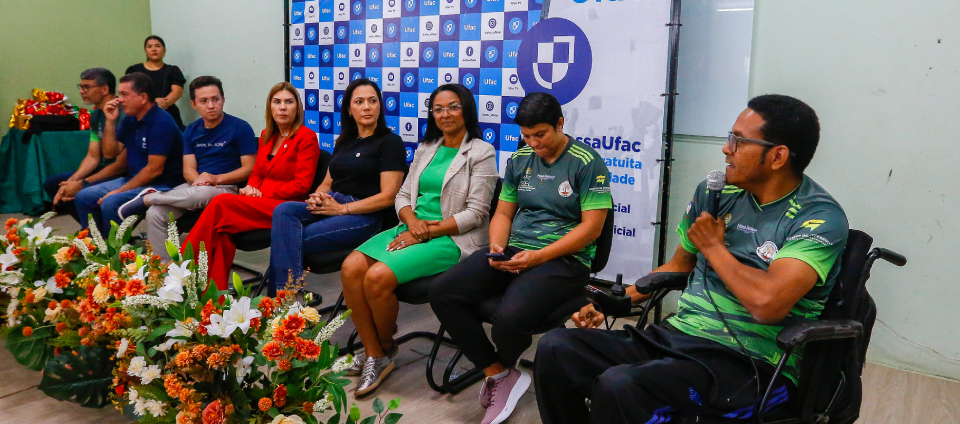ACRE
Netanyahu’s appeal to the Lebanese people falls on deaf ears in Beirut
PUBLICADO
1 ano atrásem
 Reuters
ReutersIsrael’s Prime Minister Benjamin Netanyahu appealed directly to the people of Lebanon in a video published on Tuesday, telling them to turn against the Iran-backed Shia group Hezbollah or risk destruction on the scale of Gaza.
“Christians, Druze, Muslims Sunni and Shia, all of you are suffering because of Hezbollah’s futile war against Israel,” he said. “Stand up and take your country back.”
But in Shia, Sunni and Christian neighbourhoods of Beirut on Wednesday morning, Netanyahu’s appeal was falling largely – if not entirely – on deaf ears.
“Yes we heard the address but nobody here listens to Netanyahu,” said Yusuf Habbal, 31, as he cut pieces of the traditional Lebanese sweet Kunafah in his shop in Tariq El Jdideh, a Sunni area.
“Nobody told Netanyahu to occupy Palestine, nobody told him to occupy Lebanon. It is the Israelis who are driving this conflict.”
But Habbal and his fellow Sunnis “also do not accept what Hezbollah is doing”, he said.
“Before Netanyahu ever spoke about Hezbollah, we were against them. Beiruti people know that Hezbollah has their own agenda. And now they are driving us into a war we do not want.”

 Joel Gunter/BBC
Joel Gunter/BBCHezbollah, which is a better-armed and more powerful force in Lebanon than the country’s own military, began firing rockets into northern Israel a year ago, in support for Hamas the day after the brutal 7 October attack.
The Hezbollah rockets signalled the beginning of a new phase of its clash with Israel. Last month, Israel escalated that simmering conflict when it expanded its bombing campaign of Lebanon, including in Beirut, before launching a ground invasion in the south of the country.
“They are striking very close to us now and it is terrifying,” said Mohammed Khair, 43, as he had his hair cut in a barber shop in Tariq El Jdideh.
“Nobody here wants this war, but nobody is going to be turned against Hezbollah by something Netanyahu said in a video,” he said.
Netanyahu was “always talking to the Palestinians, to the Lebanese,” said Tarraf Nasser, a 76-year-old retiree who was passing by the barber shop. “Nobody listens to Netanyahu,” he said. “He is not really talking to us.”

 Joel Gunter/BBC
Joel Gunter/BBCIn Achrafieh, Beirut’s main Christian neighbourhood, there was a sense of futility at the Lebanese people’s ability to heed Netanyahu’s advice, even if they wanted to.
Antoine, a 75-year-old Catholic retiree, who asked to be identified only by his first name, was smoking a cigarette outside the neighbourhood’s Brewholic Café.
“Benjamin Netanyahu is the prime minister of Israel, not Lebanon. He should take care of his people, not ours,” Antoine said.
“At the same time, it is true that we have to do something to be free from the influence of Iran. But we don’t have weapons and we don’t have politicians who can be truly Lebanese. All our politicians are affiliated to other states or groups, mostly Iran.”
Nobody in Lebanon was going to have domestic conflict because Netanyahu instructed them to, Antoine said. “We will do that on our own.”
Across the road in her shoe shop, Maya Habib, 35, gave a tired shrug at the Israeli prime minister’s video appeal. “Everyone here knows that Israel lies,” she said. “But listen, maybe he has a point. He warned everyone – don’t attack us, don’t come close to us, and it won’t be your war. Now it is.”
Among the Christians of Achrafieh, “people are paying attention” to Netanyahu, Habib said. “But nobody can do anything anyway,” she said, shrugging again. “We don’t even have a president. Netanyahu is saying all the weapons should go to the Lebanese army, but how?”

 Joel Gunter/BBC
Joel Gunter/BBCHezbollah can still rely on staunch support in the neighbourhoods where it is the dominant force in political and social life, and among the Shia communities of mixed areas. Several Shia residents of the Mar Elias neighbourhood said they stood completely behind the group.
“We are all Hezbollah here, whatever Hezbollah does we will support them,” said Fadi Ali Kiryani, a 52-year-old corner shop owner. Like other people in Mar Elias, Kiryani said he was not concerned by Netanyahu’s threat that Lebanon would suffer the same destruction and suffering as Gaza.
“Even if it becomes worse here than Gaza, we will still fly the flag,” he said.
“My house in Dahieh has already been destroyed. I would rather my house was gone than the shoe on the foot of one Hezbollah fighter was damaged.”
Sitting behind the desk of her 40-year-old towel and bedlinens shop, 75-year-old Fany Sharara said that Hezbollah was the only force defending the people of Lebanon.
“Nothing Netanyahu could say could change my mind,” she said. “He is a criminal, an assassin, he cannot leave one child alive.”
Israel had “all of Europe and all of America” on its side, Sharara added. “We are with Hezbollah because they are the only ones defending us. Not the Lebanese government.”
A few doors down, and a few years younger, 24-year-old jewellery shop owner Ali Shoura was simply weary of everyone involved, he said. “Nobody really cares – the politicians, the people in power, the Lebanese government, Iran, Israel, America, Hezbollah too.”
He shook his head. “It’s all just theatre,” he said. “And we are all the victims.”
Joanna Mazjoub contributed to this report.
Relacionado
VOCÊ PODE GOSTAR
Anthony Edwards says Wolves have no offensive identity, he can’t get downhill with ‘four people at the rim’
St. Michael’s to host Dexter for title; Robertson falls 27-24 on late field goal | Sports
A New “Wicked” Interview Clip Is Going Viral Because Of Cynthia Erivo’s Baffling Response To A Journalist Saying That People Are “Holding Space” For “Defying Gravity”
ACRE
Nota da Andifes sobre os cortes no orçamento aprovado pelo Congresso Nacional para as Universidades Federais — Universidade Federal do Acre
PUBLICADO
1 semana atrásem
23 de dezembro de 2025Notícias
publicado:
23/12/2025 07h31,
última modificação:
23/12/2025 07h32
Confira a nota na integra no link: Nota Andifes
Relacionado
ACRE
Ufac entrega equipamentos ao Centro de Referência Paralímpico — Universidade Federal do Acre
PUBLICADO
2 semanas atrásem
18 de dezembro de 2025A Ufac, a Associação Paradesportiva Acreana (APA) e a Secretaria Extraordinária de Esporte e Lazer realizaram, nessa quarta-feira, 17, a entrega dos equipamentos de halterofilismo e musculação no Centro de Referência Paralímpico, localizado no bloco de Educação Física, campus-sede. A iniciativa fortalece as ações voltadas ao esporte paraolímpico e amplia as condições de treinamento e preparação dos atletas atendidos pelo centro, contribuindo para o desenvolvimento esportivo e a inclusão de pessoas com deficiência.
Os equipamentos foram adquiridos por meio de emenda parlamentar do deputado estadual Eduardo Ribeiro (PSD), em parceria com o Comitê Paralímpico Brasileiro, com o objetivo de fortalecer a preparação esportiva e garantir melhores condições de treino aos atletas do Centro de Referência Paralímpico da Ufac.
Durante a solenidade, a reitora da Ufac, Guida Aquino, destacou a importância da atuação conjunta entre as instituições. “Sozinho não fazemos nada, mas juntos somos mais fortes. É por isso que esse centro está dando certo.”
A presidente da APA, Rakel Thompson Abud, relembrou a trajetória de construção do projeto. “Estamos dentro da Ufac realizando esse trabalho há muitos anos e hoje vemos esse resultado, que é o Centro de Referência Paralímpico.”
O coordenador do centro e do curso de Educação Física, Jader Bezerra, ressaltou o compromisso das instituições envolvidas. “Este momento é de agradecimento. Tudo o que fizemos é em prol dessa comunidade. Agradeço a todas as instituições envolvidas e reforço que estaremos sempre aqui para receber os atletas com a melhor estrutura possível.”

O atleta paralímpico Mazinho Silva, representando os demais atletas, agradeceu o apoio recebido. “Hoje é um momento de gratidão a todos os envolvidos. Precisamos avançar cada vez mais e somos muito gratos por tudo o que está sendo feito.”
A vice-governadora do Estado do Acre, Mailza Assis da Silva, também destacou o trabalho desenvolvido no centro e o talento dos atletas. “Estou reconhecendo o excelente trabalho de toda a equipe, mas, acima de tudo, o talento de cada um de nossos atletas.”
Já o assessor do deputado estadual Eduardo Ribeiro, Jeferson Barroso, enfatizou a finalidade social da emenda. “O deputado Eduardo fica muito feliz em ver que o recurso está sendo bem gerenciado, garantindo direitos, igualdade e representatividade.”
Também compuseram o dispositivo de honra a pró-reitora de Inovação, Almecina Balbino, e um dos coordenadores do Centro de Referência Paralímpico, Antônio Clodoaldo Melo de Castro.
(Camila Barbosa, estagiária Ascom/Ufac)
Relacionado
ACRE
Orquestra de Câmara da Ufac apresenta-se no campus-sede — Universidade Federal do Acre
PUBLICADO
2 semanas atrásem
18 de dezembro de 2025A Orquestra de Câmara da Ufac realizou, nesta quarta-feira, 17, uma apresentação musical no auditório do E-Amazônia, no campus-sede. Sob a coordenação e regência do professor Romualdo Medeiros, o concerto integrou a programação cultural da instituição e evidenciou a importância da música instrumental na formação artística, cultural e acadêmica da comunidade universitária.
A reitora Guida Aquino ressaltou a relevância da iniciativa. “Fico encantada. A cultura e a arte são fundamentais para a nossa universidade.” Durante o evento, o pró-reitor de Extensão e Cultura, Carlos Paula de Moraes, destacou o papel social da arte. “Sem arte, sem cultura e sem música, a sociedade sofre mais. A arte, a cultura e a música são direitos humanos.”
Também compôs o dispositivo de honra a professora Lya Januária Vasconcelos.
(Camila Barbosa, estagiária Ascom/Ufac)
Warning: Undefined variable $user_ID in /home/u824415267/domains/acre.com.br/public_html/wp-content/themes/zox-news/comments.php on line 48
You must be logged in to post a comment Login